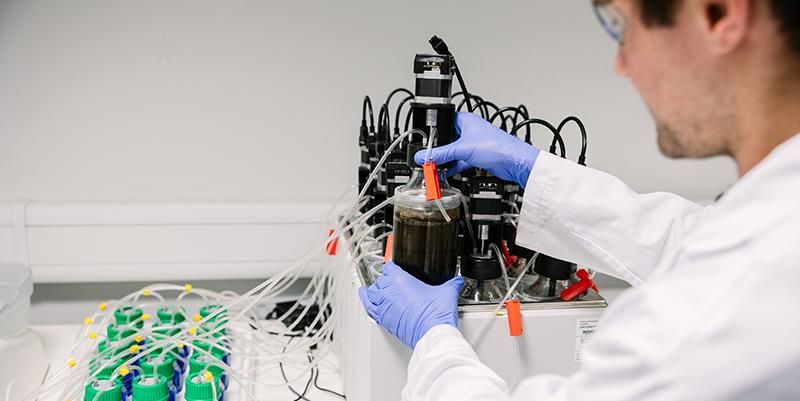Equipment and facilities

The Agri-Energy programme brings together specialist equipment and interdisciplinary expertise from across the University to develop and test new forms of agri-energy systems.
Net Zero Agriculture Living Lab
Following significant investment, we are developing the University of Leeds Research Farm as a unique living lab facility for the development of net zero farm energy systems. Operating commercially, the smart farm incorporates digital instrumentation and sensors to enable a ‘whole systems’ approach to agricultural and livestock research.
It is home to:
- the Terrestrial Observatory, a £3 million suite of instrumentation and research tools
- Smart Agri-Systems programme, designed to provide insights into farming practice
- the National Pig Centre, part of the UK-wide Centre for Innovation Excellence in Livestock.
Bioenergy and nutrient recovery from organic waste
Our research schools provide technical services and laboratory equipment to model and analyse bioenergy systems.
The School of Civil Engineering offers access to a wide range of specialist research laboratories and analytical facilities. These include public health engineering laboratories with separate areas for water and wastewater, experimental rigs, a Class II microbiology lab and clean laboratory for molecular biology work, and the solid waste management sample preparation laboratory.
Our services include the following:
- physical, chemical and microbiological characterisation of wastewater, sludge, digestate, manures and feedstocks for anaerobic digestion, through a range of techniques including gas and ion chromatography, UV-Vis and FTIR spectroscopy, and a Hach AP3900 Robotic Analyser for the automated analysis of liquid and (digested) solid samples
- anaerobic biodegradability tests to assess the biohydrogen and biomethane potential of organic wastes and feedstocks
- molecular microbiology-based techniques to detect and characterise microbial populations in environmental samples (soils) and engineered systems (AD facilities)
- lab- and bench-scale for anaerobic biodegradability trials and experimental process optimisation.
The School of Chemical and Process Engineering offers expertise and facilities in both experimental modelling systems and life-cycle analysis of biowastes, including:
- experimental testing of hydrothermal conversion
- anaerobic digestion of process waters and slurries
- process simulation and modelling
- gasification
- processing biowastes by pyrolysis
- characterisation and testing of product streams
- analytical facilities to study the safety and environmental impact of materials
- life-cycle analysis of greenhouse gas emissions from waste and the impact of processes on the environment.
Smart energy systems
Working with the School of Electronic and Electrical Engineering’s extensive facilities and purpose-built laboratories, we can prototype and test resilient agri-energy systems for the future. Experimental facilities include:
- solar power laboratory
- electromechanical test rigs with various transducers
- smart Grid Laboratory with Power-Hardware-in-the-Loop and microgrid prototyping
- smart energy systems and energy storage laboratory
- hardware platforms to model, analyse and control the design of next-generational power systems.